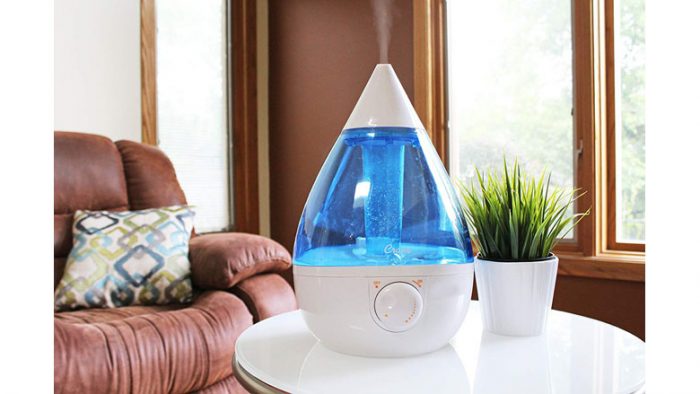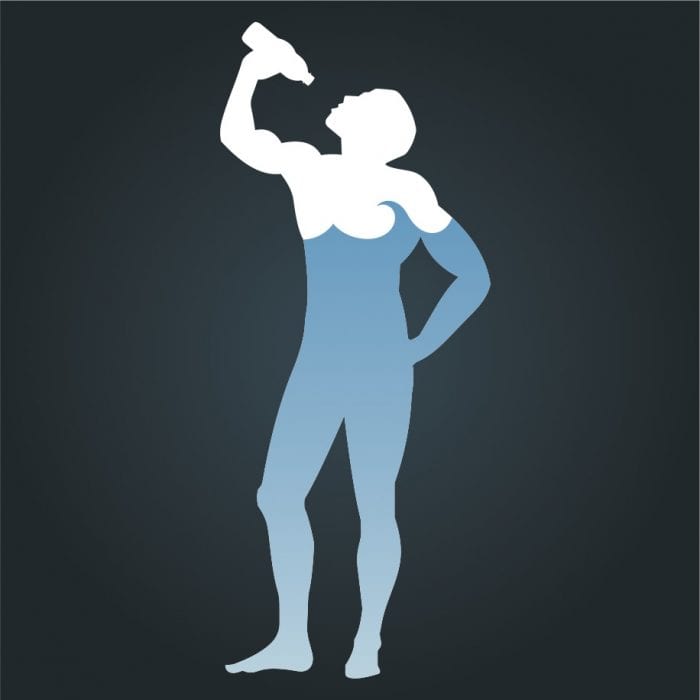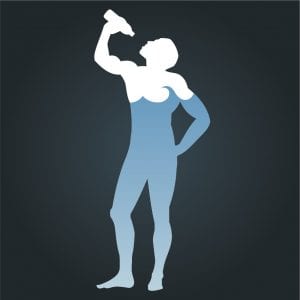By David Dunaief, M.D.

Now that we’re settling into the cooler winter months, dehydration is resurfacing as a challenge. Dry heat makes it hard to stay hydrated or to keep any humidity in your home or office, which can dehydrate your body.
Complications and symptoms of dehydration can be mild to severe, ranging from constipation, mood changes, itchy skin, headaches and heart palpitations to heat stroke, migraines and heart attacks.
The dry air can also make our throats and sinuses dry, making us uncomfortable and more susceptible to irritations and viruses.
Let’s look at some suggestions for keeping hydration up and some consequences of dehydration.
How do you keep humidity in the air?
To reduce sinus inflammation and dry skin that heated air can promote, measure the humidity level in your home with a hygrometer and target keeping it between 30 and 50 percent (1). When the temperature outside drops below 10 degrees Fahrenheit, lower this to 25 percent.
Strategies for adding moisture to the air include using cool mist humidifiers, keeping the bathroom door open after you bathe or shower, and placing bowls of water strategically around your home, including on your stovetop when you cook. If you use a humidifier, take care to follow the manufacturer’s care instructions and clean it regularly, so you don’t introduce bacteria to the air.
Reducing headaches and migraines
In a review of studies published in the Handbook of Clinical Neurology, those who drank four cups or more of water had significantly fewer hours of migraine pain than those who drank less (2). Headache intensity decreased as well.
Decreasing heart palpitations
Heart palpitations are very common and are broadly felt as a racing heart rate, skipped beat, pounding sensation or fluttering. Dehydration and exercise contributing to this (3). They occur mainly when we don’t hydrate before exercising. If you drink one glass of water before exercise and then drink during exercise, it will help avoid palpitations. Though these symptoms are not usually life-threatening, they can make you anxious.
Lowering heart attack risk
The Adventist Health Study showed that men who drank more water had the least risk of death from heart disease (4). Group one, which drank more than five glasses of water daily, had less risk than group two, which drank more than three. Those in group three, which drank fewer than two glasses per day, saw the lowest benefit, comparatively. For women, there was no difference between groups one and two, although both fared better than group three.
The reason for this effect, according to the authors, may relate to blood or plasma viscosity (thickness) and fibrinogen, a substance that helps clots form.
Decreased concentration and fatigue
Mild dehydration resulted in decreased concentration, subdued mood, fatigue and headaches in women in a small study (5). The mean age of participants was 23, and they were neither athletes nor highly sedentary. Dehydration was caused by walking on a treadmill with or without taking a diuretic (water pill) prior to the exercise. The authors concluded that adequate hydration was needed, especially during and after exercise.
I would also suggest, from my practice experience, hydration prior to exercise.
How much water should you drink?
How much water we need to drink depends on circumstances, such as diet, activity levels, environment and other factors. It is not true necessarily that we all should be drinking eight glasses of water a day. In a review article, researcher analyzed the data, but did not find adequate studies to suggest that eight glasses is the magic number (6). It may actually be too much for some patients.
You may also get a significant amount of water from the foods in your diet. Nutrient-dense diets, like Mediterranean or Dietary Approaches to Stop Hypertension (DASH) diets, have a plant-rich focus. Diets with a focus on fruits and vegetables increase water consumption (7). As you may know, 95 percent of the weights of many fruits and vegetables are attributed to water. An added benefit is an increased satiety level without eating calorically dense foods.
Remember that salty foods can dehydrate you, including breads and pastries, so try to avoid these.
Should you avoid caffeinated beverages?
In a review, it was suggested that caffeinated coffee and tea don’t increase the risk of dehydration, even though caffeine is a mild diuretic (8). With moderate amounts of caffeinated beverages, the liquid in them has a more hydrating effect than its diuretic effect. It is important to stay hydrated to avoid uncomfortable — and sometimes serious — complications. Diet is a great way to ensure that you get the triple effect of high nutrients, increased hydration and sense of feeling satiated without calorie-dense foods. However, don’t go overboard with water consumption, especially if you have congestive heart failure or open-angle glaucoma (9).
References:
(1) epa.gov (2) Handb Clin Neurol. 2010;97:161-72. (3) my.clevelandclinic.org. (4) Am J Epidemiol 2002 May 1; 155:827-33. (5) J. Nutr. February 2012 142: 382-388. (6) AJP – Regu Physiol. 2002;283:R993-R1004. (7) Am J Lifestyle Med. 2011;5(4):316-319. (8) Exerc Sport Sci Rev. 2007;35(3):135-140. (9) Br J Ophthalmol. 2005:89:1298–1301.
Dr. David Dunaief is a speaker, author and local lifestyle medicine physician focusing on the integration of medicine, nutrition, fitness and stress management. For further information, visit www.medicalcompassmd.com or consult your personal physician.










